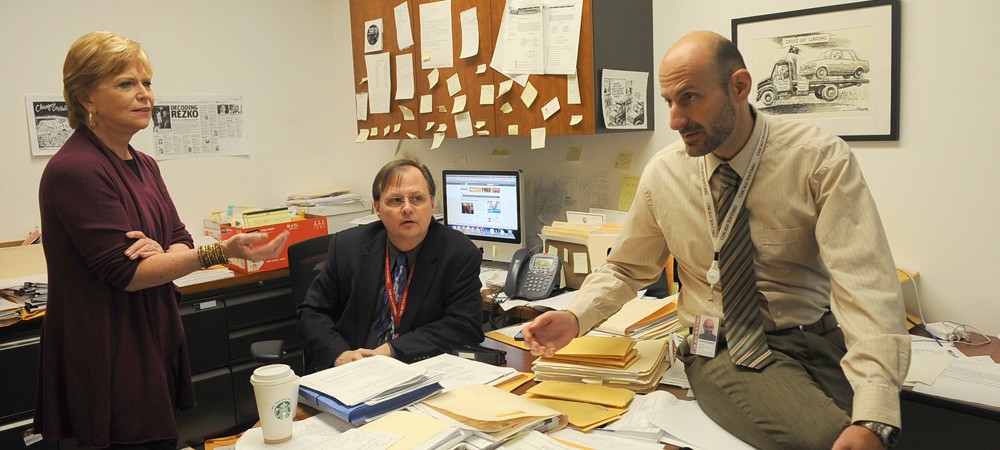
Reporters Carol Marin, Tim Novak and Chris Fusco. | Sun-Times Media
SUN-TIMES BROUGHT KOSCHMAN CASE TO LIGHT
Published Dec. 4, 2012
By DAVID ROEDER
Staff Reporter
The indictment returned Monday against Richard J. “R.J.” Vanecko resulted from a special prosecutor’s investigation prompted by dozens of news stories published by the Chicago Sun-Times.
Twice in a span of seven years, the Chicago Police Department found no reason to charge Vanecko, a nephew of former Mayor Richard M. Daley, in the 2004 death of 21-year-old David Koschman of Mount Prospect.
But, in April, Cook County Circuit Judge Michael P. Toomin, citing the Sun-Times reports, appointed former U.S. Attorney Dan K. Webb to reinvestigate the case – and to determine if criminal charges should be brought against anyone in the Police Department or the Cook County state’s attorney’s office.
The stories – by reporters Tim Novak, Chris Fusco and Carol Marin, working with editor Paul Saltzman – exposed a botched investigation into Koschman’s death. Starting with their first story, published Feb. 28, 2011, and over the next 10 months, the reporters:
† Brought to light for the first time that the mayor’s nephew was the one who struck Koschman.
† Revealed that, as Koschman lay mortally injured in the street, Vanecko ran away.
† Turned up discrepancies between what witnesses said they told detectives and what the police wrote in their reports.
† Exposed what Toomin would later label a “missing-files syndrome.” The state’s attorney’s office was unable to locate any records of its involvement in the case. And a police file showed up in August 2011 – six months after the police closed the case. The missing file contained a report that said Vanecko was being “very aggressive” toward Koschman even before striking him – a statement that contradicted the official version the police provided.
Until Vanecko was called in for a police lineup on May 20, 2004, the news media hadn’t reported on Koschman’s death. Then, when no charges were filed, the case quickly faded from public attention.
Novak said it bothered him that no one ever learned exactly what Vanecko’s involvement was.
Five years ago, he reached out to Koschman’s mother, Nanci Koschman, who was too distraught to talk about her son’s death at length. But she did reveal she’d been told by the police that the man who hit her son had run off, leaving him unconscious on the street.
“It always kind of bugged me that they just ran away,” Novak said.
A few years later, Novak thought that recent changes in the Illinois Freedom of Information Act would help him access police reports in the Koschman case, so he filed a request for those records on Jan. 4, 2011. The response a couple of weeks later was a surprise: The police said they couldn’t release the reports because the investigation remained open.
As a result, Novak didn’t have much to go on, not even the names of witnesses. He began with Koschman’s online death notice, tracking down everyone who had left a condolence message. One of those people gave him the names of the friends who had been with Koschman. Novak and Fusco’s interviews with them provided key elements for the stories that followed and helped persuade Nanci Koschman to speak with the reporters.
After the first two stories were published, the police announced they were formally closing the case without seeking charges against Vanecko, who they said acted in self-defense, though he had never spoken to the police.
Novak, Fusco and Marin kept digging, uncovering new details that cast further doubt on the official story. In December 2011, Nanci Koschman’s lawyers cited their reporting as they filed a petition asking that a special prosecutor reinvestigate the politically explosive case.
Four months later, Toomin granted that petition, declaring “the system has failed” David Koschman and criticizing “the fiction of self-defense . . . conjured up by police and prosecutors.”
“This is probably the most significant story I’ve ever done because we’re trying to right a wrong,” said Novak, who previously exposed what became known as the Hired Truck Scandal for which 48 people were convicted and sent to prison. “Somebody died on the streets, and nobody wanted to figure out what happened.”
Fusco added: “This case isn’t just about who’s charged. It’s about making sure that, in the eyes of the law, the David Koschmans of the world are treated the same as the people with money and power.”


